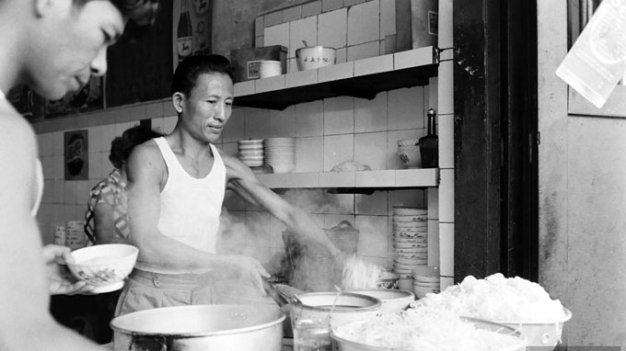In modern-day Ho Chi Minh City, which is full of Western fast food chains, old-style, Chinese-Vietnamese owned shops offering delectable Chinese breakfasts and tea are reminiscent of the good old days, and still retain their appeal to the Chinese-Vietnamese community and Chinese-speaking expats.
“Cha thoi” are shops which offer mouth-watering iconic Chinese breakfasts and fragrant tea.
Apart from the former Ton That Dam Market in District 1, such shops are also easily found in Cho Lon, in Districts 5 and 6.
Eighty-year-old Tu of District 11 has practiced the habit of “dam cha,” which means to have breakfast and tea in Cantonese, since he was young.
He is a regular at several such shops, including Thuan Kieu Fish Hotpot Restaurant (190 Hong Bang Street, District 5).
‘Cha thoi’ shops in the past
Decades ago, men and kids, but not women, were regular customers at such shops.
Whenever a customer stepped inside, one waiter quickly served free tea, while another brought out tasty Chinese breakfast dishes such as “ha cao” (fun guo, or shrimp dumpling), “xiu mai” (shumai, or meatballs in tomato sauce), “banh bao” (dumpling), “chao trang” (porridge) and “quay" (youtiao, or Chinese cruller).
According to historical materials, people from China’s Hainan Province were the first Chinese settlers in Vietnam.
They earned their living mostly as small traders and “cha thoi” shop owners.
However, few “cha thoi” shops owned by Hainanese remain in operation in Ho Chi Minh City.
'Cha thoi' shops now
Over the course of time, the old-style “cha thoi” shops have faced fierce competition from modern Hong Kong-style breakfast shops, which began to appear in Vietnam in the 1990s, and Western fast food chains in more recent years.
Though the golden age of these shops is long gone, a number of them remain open, to the satisfaction of their long-standing patrons.
One such business is 60-year-old Tuong Hung Long Shop, at 190 Hau Giang Street, District 6.
After the shop’s owner, who left Guangdong Province’s Chaozhou City in China to settle in Vietnam, passed away, his children and grandchildren continued to run it. The eatery is open from 5:00 am to 11:00 am every day.
The shop retains its original décor, layout, menu and cooking style, and still uses bamboo cooking utensils to steam food, instead of aluminum or stainless steel tools.
Most “cha thoi” shops now typically call themselves breakfast shops on their signs.
A shop at 259 Hong Bang Street in District 5 still offers Chinese delicacies in small dishes for VND27,000 (a little over US$1) apiece.
Another “cha thoi” shop which still draws a large number of Chinese-Vietnamese people, particularly the elderly, is Trung Mai Shop, located in an alley on Phu Dinh Street in District 5.
Tan Lac Vien Restaurant, at 1195-1197 Ba Thang Hai Street in District 11, has served appetizing Chinese breakfast dishes in the “cha thoi” style for over 20 years.
Nowadays, the customers at “cha thoi” shops are no longer limited to men and kids.
On weekends or holidays, Chinese-Vietnamese families are often seen relishing delectable Chinese dishes and tea together at “cha thoi” shops or restaurants including Thuan Kieu, Tan Lac Vien, Bay Ky Quan, and Cat Tuong in Districts 5 and 6.
Like us on Facebook or follow us on Twitter to get the latest news about Vietnam!




















































